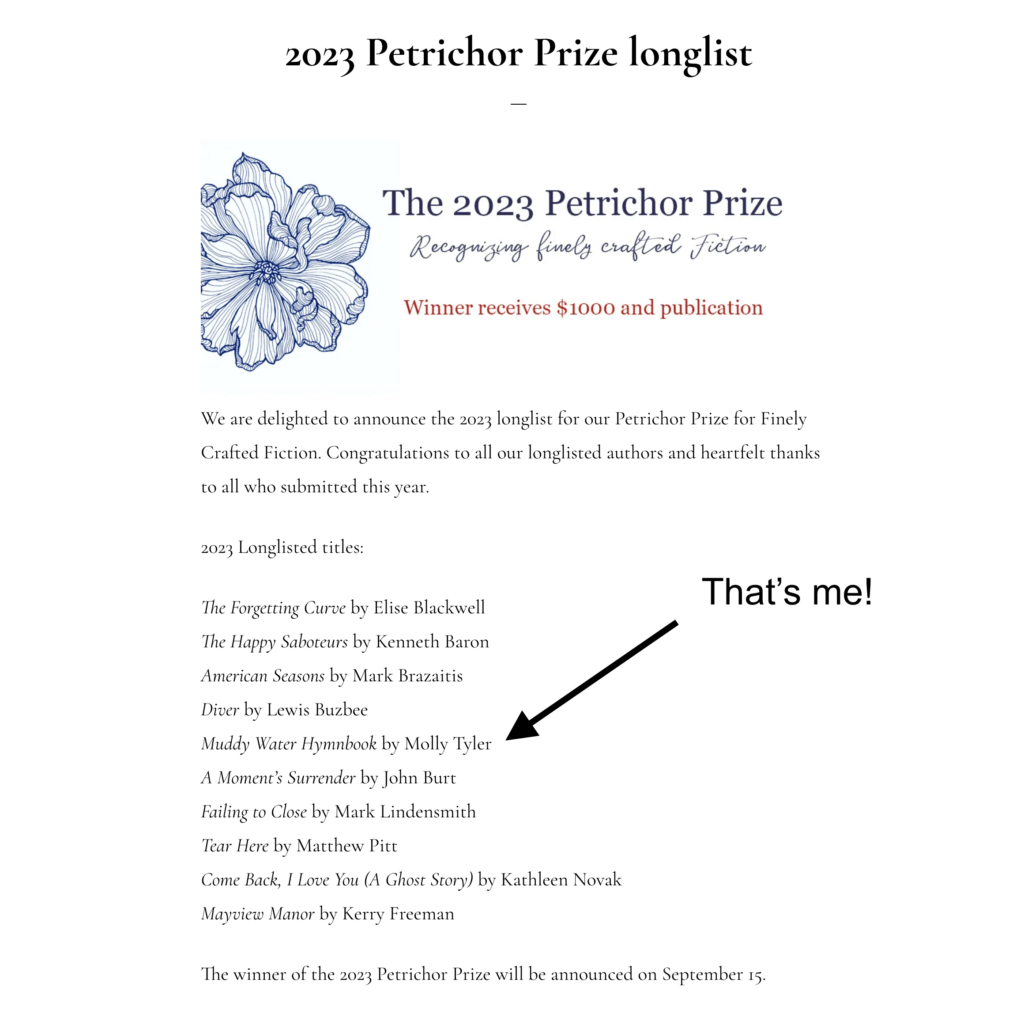Writing contests are one of many paths to traditional publishing. Typically hosted by smaller independent presses, they offer an opportunity to have your work read and considered by editors without sending it straight to the slush pile and hoping for the best.
While querying for my first novel, I submitted it to several writing contests. Although the book is still unpublished, I did have a little bit of success — it was longlisted for the 2023 Petrichor Prize for Finely Crafted Fiction at Regal House Publishing.

I definitely plan to continue submitting work to writing contests in the future. If you’re thinking the same, here are my tips for finding contests and submitting your work to them.
Why Should You Submit to Writing Contests Instead of Querying Agents?
First off, you can submit your work to small presses and writing contests and query agents. No harm in casting a wide net!
That said, if your work is less commercial in nature, it can sometimes be easier to capture the interest of an independent press than a literary agent who works primarily with big publishers. Agents have to focus on representing work they think they can sell. While small presses also need to sell books to stay afloat, many of them are more inclined to take on books based on other factors as well.
So, if your novel has a more niche audience, or uses uncommon writing techniques (like hybrid genre works), you might be more successful submitting it to writing contests at small presses that specialize in books like yours, rather than pursuing representation with an agent.
Where to Find Writing Contests
My preferred place to search for writing contests is the Poets & Writers database.
This is an authoritative source for finding contests to submit your work to, and it enables you to easily filter search results to match your qualifications.
You can also look through the Poets & Writers small press database and see if any of the presses you’re interested in have upcoming contests. Many have annual contests, which may not show up in the contest database if the current reading period is closed. You can check the press’s website to find out if they have a recurring contest and when it will reopen for submissions.
Writing Contest Tips for Aspiring Authors
The best tips for submitting work to writing contests are pretty much the same tips you would want to follow when querying agents or submitting directly to independent publishers. It all boils down to doing your research.
Here’s what I look at when deciding whether to submit my work to a contest:
- The Contest page. This is an obvious first stop for gathering information on whether a contest is a good fit for your book. The contest page should tell you basic qualifications for submitting your work, like how long it should be and which genre the contest is for. Sometimes it will also include details on the type of work the press wants to see, but not always. That’s why you should do a little more digging in addition to reading the contest guidelines.
- The press’s About page. Just like when you’re querying agents, it’s super important to make sure that your work is the type of work a press wants to publish before you submit it. If you’ve written a thriller and you submit it to a contest from a press that specializes in nature writing, you’re clearly not going to come out on top. It’s a waste of time for you and the editors at the press! Make sure to read the press’s About page and their general submissions guidelines (if they have them posted).
- Other books the press has published in my genre. Another way to tell if your work will be a good fit for the press—and if they press will be a good fit for you—is to look at books they’ve published in your genre. Do those books deal with similar themes and topics to your novel? Can you see your book fitting in well with the press’s existing catalog? And on the flip side, does the press have experience publishing works in your genre? How did those books perform? Where are they sold? If you win the contest, this is the company that will be responsible for bringing your book into the world. Do you trust them with that task?
- Past winners. Presses will usually include a list of past winners on the Contest page. It’s worth your time to look these authors up and check out their books. This will give you an idea of what the editors like and are looking for in contest submissions.
- The guest judge. Some contests are judged only by an editor at the press, but others will have guest judges who also review submissions and have a say in selecting the winner. Often it’s a previous winner or an author who’s published with the press. Make sure you take the time to look this person up as well. Consider whether your work is likely to resonate with them just like you would and agent or editor.
Are Writing Contest Submission Fees a Scam?
It’s normal for presses to charge a small submission fee (in my experience, it’s usually $25 or less). This is not a scam—it’s how the press affords to pay the editor(s) working on the contest as well as the prize for the winning author.
Unlike agents who charge a reading fee, you don’t need to be wary of contests that require you to pay to enter. This is one drawback of submitting to writing contests, and yet another reason to make sure you’re doing your research about the contests you’re submitting to. Don’t waste entry fees on presses that aren’t a good fit for your book.
What Do You Get if You Win a Writing Contest?
Usually, the winning title is published by the press holding the contest. Some publishers also offer publication to the runner up.
Often, but not always, there is also a cash advance for the winner. Most of the contests I’ve entered offer $1,000–2,000 to the winner, although I’ve seen a few that offer more or less. In some cases, the second and third place titles will also receive cash prizes.
The prize details should be available on the contest’s page on the website of the press that is hosting it.
Conclusion
For some writers, contests are the perfect path to publication. Especially if your novel isn’t particularly mainstream, entering contests can be a more effective way to have your work seen and read by editors than submitting to literary agents or directly to small presses.
Always do your research before submitting your work to a writing contest and make sure it’s a good fit for the press that’s hosting the contest. Best of luck!
Featured Image Credit: Unsplash

Leave a Reply